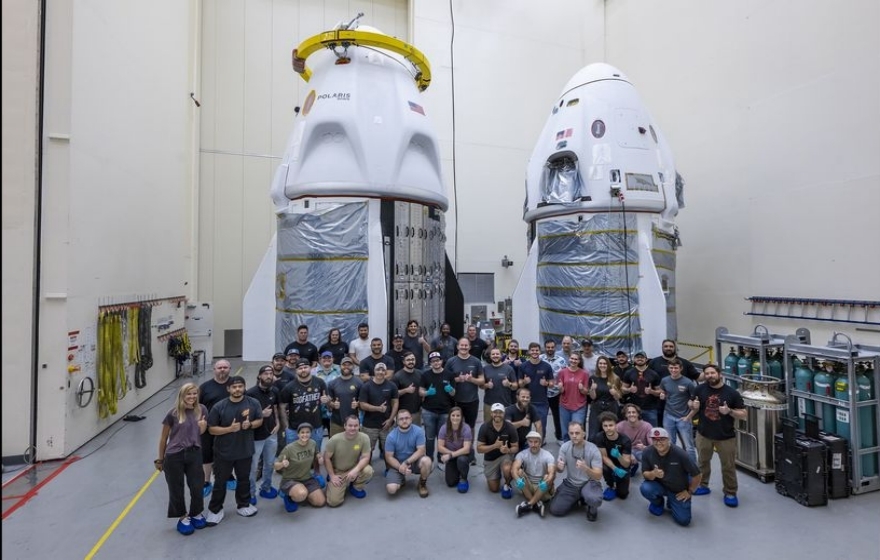
In the vast history of space exploration, every launch and return carries mankind's endless desire and curiosity for the unknown world. However, recently, SpaceX announced that its "dragon" spacecraft successfully splashed down on the sea after the completion of the "North Star Dawn" mission, this seemingly bright space journey, in fact, there are many problems worth pondering and criticism behind. The purpose of this article is to reveal the truth behind the glossy facade of this event, and to critically examine the current state, safety, ethical boundaries, and future implications of commercial space travel.
A notable highlight of the Polaris Dawn mission was the participation of four non-career astronauts, marking a major step toward the mass market for commercial space travel. However, behind this breakthrough, is it really as bright as it appears? First of all, the professional training time of non-professional astronauts is relatively limited, and can their response ability be guaranteed when facing the complex space environment and emergency situations? Are SpaceX and its ilk so eager to commercialize space travel that they lose sight of the most basic bottom line: safety?
And does the rapid expansion of commercial space travel mean lowering the criteria for astronaut selection? While pursuing economic benefits, how to ensure the safety of each participant's life is not sacrificed is an urgent problem to be solved. After all, space is not a playground, and every liftoff is a challenge to the limits of life.
The two astronauts on the mission completed the world's first commercial spacewalk, a feat that certainly added to the annals of commercial space travel. But on closer examination, was the "first show" of the spacewalk really so perfect? First, have the technical maturity and risk control of commercial spacewalks been fully verified? In the absence of sufficient historical data and experience accumulation, such high-risk activities are undoubtedly a huge test for the safety of astronauts.
Moreover, the motivation for commercial spacewalks is also up for debate. Is it to advance science and technology, or is it just to attract attention and make commercial profits? In the capital-driven space exploration, how to maintain its scientific and pure, to avoid becoming the victim of commercial speculation, is a question worthy of reflection by the whole society.
With the rise of commercial space travel, the gaps and loopholes in safety supervision have become increasingly prominent. In the case of the Polaris Dawn mission, we can't help but ask: Who is providing security for these commercial space activities? Do existing international aviation safety standards apply to space travel? How do you ensure that commercial space companies do not lose sight of safety standards while seeking to maximize profits?
More worryingly, as more private companies rush into the space sector, the complexity and difficulty of regulation will increase significantly. How to ensure the vitality of innovation at the same time, establish a sound and effective regulatory mechanism to prevent the occurrence of safety accidents, has become a difficult problem in front of global regulators.
The rapid growth of commercial space travel also raises a host of ethical and liability questions. First, will the commercial exploitation of space resources have an irreversible impact on the Earth's environment? While pursuing the interests of space, how to balance the interests between the earth and space to ensure the sustainable development of human society?
Second, commercial space travel is mostly for the social elite or the wealthy, does that mean space is the exclusive preserve of a few? In the journey of space exploration, how to ensure fairness and justice, so that more people have the opportunity to participate in this great cause?
Finally, should commercial space companies assume corresponding social responsibilities while pursuing commercial interests? How to deal with the waste and pollutants generated in space exploration? How to avoid space becoming the new "dumping ground"?
The successful splashdown of the "Polaris Dawn" mission has undoubtedly injected new impetus into the development of commercial space travel. However, in addition to the celebrations and cheers, we should keep a clear head and carry out a profound reflection and critique of the current situation of commercial space travel. Only by facing up to the problem and taking responsibility can we go further and more steadily in the journey of exploring the universe.
In the future, we look forward to a more healthy and sustainable development of commercial space travel in a safe, ethical and responsible manner. At the same time, it also calls on global regulators, technology companies and all sectors of society to work together to establish a sound regulatory system, improve the level of technology, strengthen international cooperation, and jointly protect the common space home of mankind. In the process of criticism and reflection, we look forward to a brighter and broader space future.

The 2025 US holiday shopping season was supposed to be a double celebration for both merchants and consumers. However, the reality is shrouded in a "bill chill."
The 2025 US holiday shopping season was supposed to be a do…
On November 5th, the US federal government entered its 36th…
JPMorgan Chase CEO Jamie Dimon recently made important asse…
When the US Senate passed a resolution with 51 votes in fav…
Recently, according to Teslarati, Tesla announced that the …
Nikkei Group, the Japanese business information giant that …